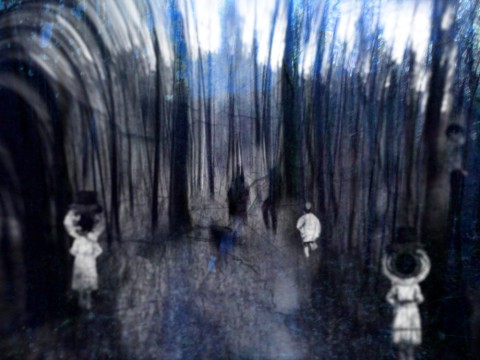All we knew about the foreign girl until that day was that she had luminous, lavender-tinged skin, cheekbones that jutted out like the mountains that lined the highways near our homes, and that she was from Bosnia. Oh, and that her name was Nadija, which few of us could correctly pronounce.
We didn’t know about the war. We guessed there was something going on over there, but talk about anything in that part of the world was a low drone, white noise like the whirr of a window fan that one doesn’t notice until, suddenly, someone pulls the plug.
We didn’t know about the massacres, the brutal deaths suffered by Croats, Serbs, anyone caught in the crossfire. Legs blown off by landmines. Churches full of children firebombed. Someone’s grandmother bleeding between her legs years after her last menstruation. A single toe in the street. Who did it belong to?
Of course, that was not a question we asked then because that was not the story Nadija told us. We learned to ask those questions years later, after it was over, when we were no longer children, when we read books between dusty shelves in college libraries and felt horror, and felt pity, and felt alone.
The story Nadija did tell us happened in ’93, a couple years before her family left Bosnia. Her village had not yet been completely destroyed, but men had been taken captive and others had gone to fight, so the only ones left were the elderly, the woman, and the children. The school became a shelter for refugees and a hospital for the wounded, so the children, with nothing else to do, were sent to work in the fields. Instead of working, though, they spent most afternoons playing tag, doing cartwheels and somersaults in the dirt, collapsing on their backs on the grass, breathless and giggling under a blue sky sometimes clouded with the dust of nearby bombs.
That was their routine, day after day. It was an endless summer vacation for Nadija and her friends, until something happened. What Nadija first said was, “Something awful happened.” Our eyes widened and our whispers ceased at the thought of tragedy touching someone so close to us. We were having recess in the gym, and she was leaning up against the wall in her white t-shirt, her breast buds poking painfully against the cotton, as all of ours were. Upon seeing the fear in our faces she corrected herself: “No, I mean something awesome happened.”
One day, Nadija and her friends went to the fields and started a game of hide-and-seek. However, as soon as each of them hid, behind a tree or in a shed, they heard a voice calling them home. They obeyed, but upon returning to their individual homes, their mothers told them they had not called for them, and they were shooed back out to the fields. This happened for days until finally the children stopped returning home upon hearing the voice. Instead, they went searching for it.
They walked through all the fields: nothing. They went to the old schoolhouse: nothing. They went down by the river: nothing. They went to the garbage dump: nothing. They didn’t know what or whom they were looking for, and finally, exhausted and hot, they stopped. They sat in a clearing, and again, at the same time as usual, they all heard the woman’s voice. This time she spoke at length. She told them that they would not be able to find her, that she could not be seen with the human eye. She said she would help them, but they would have to trust her, believe in her. She told them they would meet again each day at noon in the same spot to receive more messages. And then she was gone.
Nadija’s story wasn’t done, but we were already incredulous. We were American children, cynical by the time our baby teeth had loosened. She told us that she, too, didn’t believe it at first. She thought she was going crazy or someone was playing a trick on her. Nevertheless, they continued to meet at that spot and the more they listened, the more they believed. The voice relayed messages about the war and their own lives, predicting things that no human could have ever predicted. The voice spoke to them every day for two years, comforting them when their fathers came home with missing arms or when their brothers were killed, warning them to avoid this or that road on the way to the market, telling them exactly how many days the war would last and when they might begin to hope for peace.
Nadija’s story ended at the end of recess, and we didn’t have time to ask her questions. We filled in the gaps: the war escalated, Nadija’s family made it to America, they settled in New Jersey, and she came to our school to begin the sixth grade. But what we didn’t know, what we desperately wanted to know was something none of us had the courage to ask, not that day in the gym, not walking in the line back to our classroom, not the rest of the year or the years after. What we wanted to know was if the voice followed her. If, across the sea and in a new land and among all of us, the voice continued to speak to her. Did she hear it during class, as she sat with perfect posture in the front of the room? Did she hear it on the blacktop amid our screams and laughs and taunts? Did she hear it at night, in the silence or low murmur of passing cars? Or, like us, did she hear no voice inside her head but her own? Was she, like us, alone?



 The SmokeLong Grand Micro Contest (The Mikey) is now an annual competition celebrating and compensating the best micro fiction and nonfiction online.
The SmokeLong Grand Micro Contest (The Mikey) is now an annual competition celebrating and compensating the best micro fiction and nonfiction online.